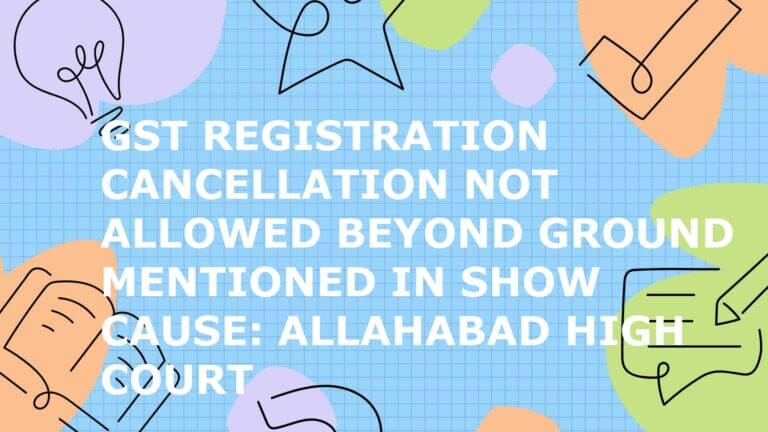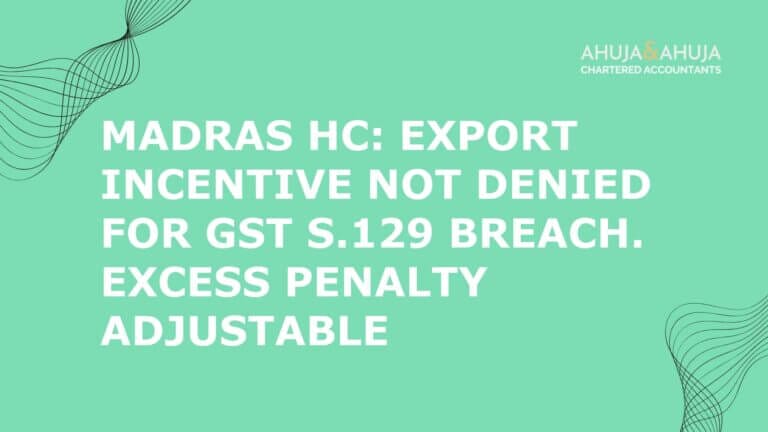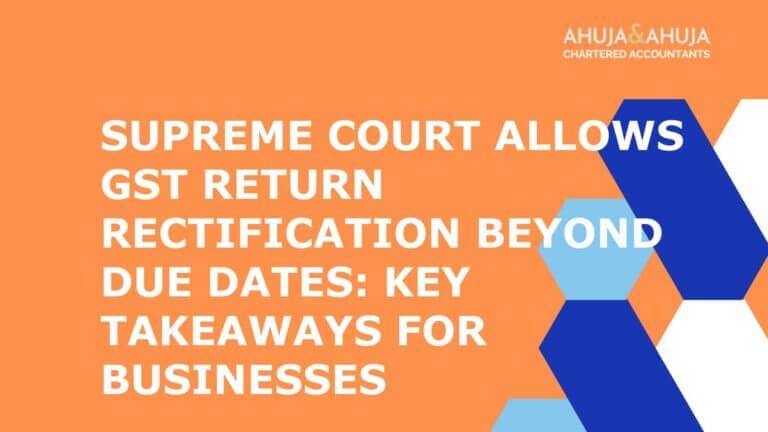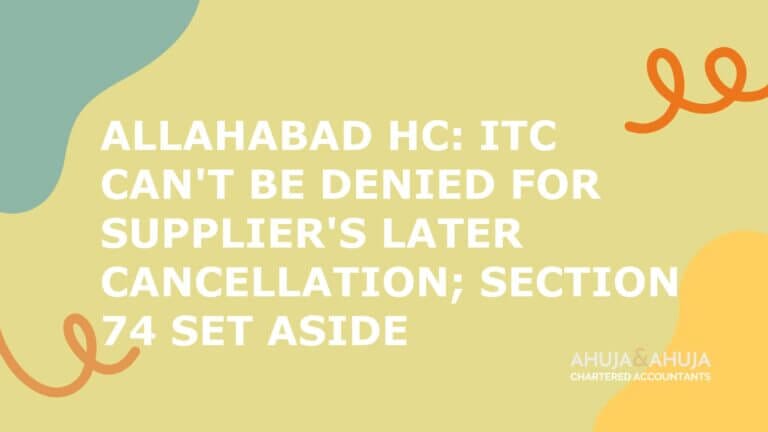GST on Ocean Freight: ITC Eligibility, Legal Challenges
Ocean freight is the backbone of India’s import economy. With over 90% of India’s trade by volume moving through sea routes, the cost and tax treatment of ocean freight directly impact the landed price of goods, working capital, and compliance for every importer, CFO, and accountant in the country.
Under the Goods and Services Tax (GST) regime, the taxability of international freight—especially in the context of Cost, Insurance, and Freight (CIF) and Free on Board (FOB) contracts—has been a source of persistent confusion and legal wrangling. The way GST applies to ocean freight not only affects the immediate tax outgo but also determines input tax credit (ITC) eligibility, the risk of double taxation, and the complexity of compliance.
This article unpacks the GST framework for ocean freight on imports, focusing on:
- The legal background and reverse charge mechanism (RCM) notifications
- The crucial differences between CIF and FOB contracts for GST purposes
- The Supreme Court’s landmark Mohit Minerals judgment and its practical impact
- ITC eligibility, refund challenges, and compliance steps for businesses
Whether you’re a CFO managing import costs, an accountant handling GST returns, or an importer seeking clarity on your tax position, this guide will help you navigate the evolving landscape of GST on ocean freight with confidence and precision.
GST on Ocean Freight – Legal Framework & Background
A. Reverse Charge Mechanism (RCM) for Ocean Freight
The GST regime introduced a unique challenge for importers by bringing ocean freight under the reverse charge mechanism. Two key notifications set the stage:
- Notification No. 8/2017-IGST (Rate): Prescribes a “deemed value” for ocean freight at 10% of the CIF value of imported goods, regardless of the actual freight paid.
- Notification No. 10/2017-IGST (Rate): Notifies that importers are liable to pay IGST under RCM on ocean freight for goods transported by vessel from outside India to an Indian port—even if the importer is not the direct recipient of the freight service.
This meant that importers, even when not contracting or paying for the freight (as in CIF contracts), were required to discharge IGST on a notional value, in addition to the IGST already paid as part of the customs value.
B. Distinctions Between CIF and FOB Contracts
- CIF (Cost, Insurance, Freight): The foreign exporter arranges and pays for freight and insurance up to the Indian port. The Indian importer pays a single price for goods delivered to India.
- FOB (Free on Board): The Indian importer arranges and pays for freight from the foreign port to India, contracting directly with the shipping line.
This distinction is not just academic. It determines who is the “recipient” of the freight service and, therefore, who bears the GST liability under RCM.
C. Inclusion of Ocean Freight in Assessable Value for Customs and IGST
Under customs law, the assessable value of imported goods (on which IGST is levied at the port) already includes the cost of ocean freight and insurance in CIF contracts. This means IGST is paid once on the full landed value.
D. Recap of Structural Anomalies and Genesis of Double Taxation Debate
The notifications created a peculiar situation: importers were required to pay IGST twice on the same freight component—once as part of the customs value, and again under RCM on a deemed value. This “double taxation” led to widespread industry pushback and legal challenges, questioning the legitimacy of taxing a service that the importer neither contracted for nor received.
The stage was thus set for a major legal showdown, culminating in the Supreme Court’s Mohit Minerals judgment—a decision that has fundamentally reshaped the GST landscape for ocean freight in India.
For businesses in Delhi and across India struggling with these complexities, consulting with expert Chartered Accountants in Delhi and Chandigarh can offer tailored compliance solutions.
Supreme Court’s Mohit Minerals Judgment – Legal Impact & Immediate Compliance Changes
A. Genesis of the Mohit Minerals Litigation
The seeds of the Mohit Minerals case were sown by the industry’s frustration with the double taxation of ocean freight in CIF imports. Importers, already paying IGST on the full CIF value at customs, were being asked to pay IGST again under RCM—even though they had no contractual relationship with the shipping line. Mohit Minerals Pvt. Ltd. challenged this before the Gujarat High Court, which ruled in favour of the importer. The matter escalated to the Supreme Court, making it a test case for the entire import community.
B. Key Findings of the Supreme Court
The Supreme Court’s judgment in Union of India v. Mohit Minerals Pvt. Ltd. (2022) is a watershed moment for GST on international freight. The Court’s analysis revolved around three core legal principles:
- Composite Supply Doctrine (Section 8, CGST Act):
The Court held that in a CIF contract, the supply of goods and the associated freight and insurance form a “composite supply,” with the principal supply being the goods themselves. Under Section 8, GST must be levied on the principal supply—here, the import of goods—rather than taxing each component separately. - Definition of ‘Recipient’ & ‘Consideration’:
The Court examined Section 2(93) of the CGST Act and found that the importer, in a CIF contract, is not the recipient of the ocean freight service. The contractual recipient is the foreign exporter, who arranges and pays for the freight. The importer pays for the goods, not the freight service. - Territorial Nexus and GST’s Constitutional Limits:
The Court acknowledged that while the destination of the goods is India, the actual service of ocean freight is rendered outside India between two foreign parties. Imposing GST on the Indian importer for such a service stretches the territorial nexus and the constitutional authority to tax.
C. Direct Impact on CIF Contracts
- Elimination of IGST Liability on Ocean Freight under RCM for Importers:
The Supreme Court categorically struck down the levy of IGST on ocean freight under RCM for CIF imports. This means importers are no longer liable to pay IGST on ocean freight in such contracts. - Compliance Change: From Which Date Does IGST Liability Cease?
The judgment applies retrospectively, as it invalidates the levy ab initio (from the beginning). Practically, importers should stop paying IGST under RCM on ocean freight for CIF contracts from the date of the Supreme Court’s decision (19 May 2022). For past periods, refund eligibility arises (discussed in the next section). - Practical Instructions: Stopping Payment, Process Change in Accounts
- Accounts teams should immediately halt any RCM payments on ocean freight for CIF imports.
- GST returns: Do not report or pay IGST under RCM for such transactions post-judgment.
- Internal controls: Update SOPs and checklists to reflect the new position.
- Example Scenario with Timelines and Revised Accounting Entries
Suppose an importer received goods under a CIF contract in June 2022. Previously, the accounts team would have booked IGST under RCM on ocean freight and claimed ITC. Post-judgment, for shipments arriving after 19 May 2022, no such RCM entry is required. For earlier periods, the business may consider refund claims for IGST paid under RCM.
D. Residual/Unresolved Issues
- Administrative Interpretations Pending Circulars
While the Supreme Court’s decision is binding, field officers may await formal CBIC circulars for operational clarity. Businesses should document their position and be ready to respond to queries. - Risk Areas Where Clarity May Still Be Needed
- Mixed contracts: Where elements of CIF and FOB are blended, careful contract review is needed.
- Refunds: The process for claiming refunds of past IGST paid under RCM is not uniform across jurisdictions.
- Audit trail: Maintain robust documentation to defend your position in case of departmental scrutiny.
Key Takeaways for CFOs, Accountants, and Importers:
- Stop paying IGST under RCM on ocean freight for CIF imports immediately.
- Update GST compliance processes and internal documentation.
- Prepare for refund claims and maintain a clear audit trail.
- Monitor for CBIC circulars and field-level instructions.
CFOs in regions like Jodhpur and Aligarh may seek professional advice to implement these compliance changes effectively. For detailed guidance on handling such legal scenarios, consider exploring our GST litigation services.
The Mohit Minerals judgment has brought long-awaited clarity, but businesses must remain vigilant in implementing these changes and preparing for the next phase—securing refunds and managing compliance for past transactions.
Past IGST Paid on CIF Ocean Freight – Refund Process, Evidence & Challenges
The Supreme Court’s Mohit Minerals judgment has not only halted future IGST liability on ocean freight under CIF contracts but also opened the door for importers to seek refunds of IGST paid under the now-invalidated levy. However, the path to securing these refunds is far from straightforward. Let’s break down the practicalities, pain points, and actionable steps for businesses.
A. Importers’ Eligibility for Refund of IGST Paid under Struck Down Levy
Importers who paid IGST on ocean freight under RCM for CIF contracts—whether out of caution or departmental insistence—are now entitled to claim refunds. The legal basis rests on the Supreme Court’s finding that such levy was ultra vires (beyond legal authority) from inception. This means the tax was never validly due, and amounts paid can be claimed back, subject to procedural compliance.
B. Scrutiny of Refund Process – Laws, Rules, and Key Circulars
Refunds of IGST paid under RCM are generally governed by Section 54 of the CGST Act and Rule 89 of the CGST Rules. However, there is no dedicated, uniform mechanism or special circular for ocean freight refunds post-Mohit Minerals. This has led to divergent practices across GST and customs formations, with some officers demanding additional documentation or raising technical objections.
C. Documentation Requirements: Invoices, Bill of Entry, Proof of RCM Payment
To substantiate a refund claim, importers should prepare a robust set of documents, including:
- Bill of Entry showing payment of IGST on the full CIF value
- RCM payment challans (GST PMT-06) and GSTR-3B returns evidencing IGST paid on ocean freight
- Shipping documents (contract, invoice) establishing the CIF nature of the transaction
- Bank statements or payment proofs, if available
- Self-declaration that the incidence of tax has not been passed on (to avoid unjust enrichment issues)
D. Pain Points
- Absence of Uniform Refund Mechanism
There is no standardised online refund module for this specific scenario. Some jurisdictions process claims as “excess payment of tax,” while others treat them as “any other” refund. This lack of clarity can lead to delays and inconsistent outcomes. - Variance in Refund Processing across Customs/GST Formations
Field officers may interpret eligibility and documentation differently. Some may insist on additional evidence or legal opinions, while others may process claims smoothly.
E. Practical Steps to Claim Refunds
- Internal Records and Audit Trail
- Collate all relevant documents (see checklist below).
- Prepare a clear reconciliation of IGST paid under RCM on ocean freight for each relevant period.
- Document the legal basis for the claim (attach a copy of the Mohit Minerals judgment).
- Illustrative Checklist for Claim Preparation
- Bill of Entry (CIF contract)
- GST payment challans (RCM)
- GSTR-3B returns (showing RCM liability and ITC, if availed)
- Shipping contract/invoice
- Self-declaration on unjust enrichment
- Covering letter referencing the Supreme Court decision
F. Examples: Approaching Jurisdictional Authorities
Suppose an importer in Mumbai paid IGST under RCM on ocean freight for CIF imports in FY 2021-22. The accounts team should:
- Prepare a refund application in Form GST RFD-01, selecting the appropriate category (e.g., “excess payment of tax”).
- Attach all supporting documents and a legal note referencing the Mohit Minerals judgment.
- Submit the claim to the jurisdictional GST officer and track the application status.
- Be ready to respond to queries or requests for additional information.
G. Prospects for Retrospective Relief or Limitations
While the Supreme Court’s decision is retrospective, practical hurdles remain:
- Time limits: Refund claims must generally be filed within two years from the “relevant date.” For many, this may be the date of the Supreme Court judgment (19 May 2022), but interpretations can vary.
- Unjust enrichment: Officers may scrutinise whether the tax burden was passed on to customers. Maintain clear records to demonstrate that the refund rightfully belongs to the business.
- No automatic refunds: Refunds are not automatic; proactive application and follow-up are essential.
Key Takeaways for CFOs, Accountants, and Importers:
- Act promptly: Review past payments and initiate refund claims without delay.
- Prepare thoroughly: Strong documentation and a clear audit trail are your best defence.
- Monitor developments: Watch for CBIC circulars or clarifications that may streamline the process.
- Engage with authorities: Be prepared for queries and maintain a professional, well-documented approach.
For assistance with refund claims and smooth GST compliance, companies may consider professional help through GST refund services and outsourcing solutions such as accounts outsourcing.
The refund process may be administratively challenging, but with careful preparation and persistence, businesses can recover amounts paid under the now-invalidated levy—improving cash flows and ensuring compliance with the law.
Disclaimer
The materials provided herein are solely for educational and informational purposes. No attorney/professional-client relationship is created when you access or use the site or the materials. The information presented on this site does not constitute legal or professional advice and should not be relied upon for such purposes or used as a substitute for professional or legal advice.







